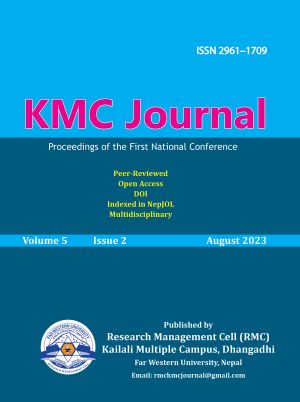Translanguaging Practices in EFL Classrooms: Teachers’ Perspectives from Darchula
DOI:
https://doi.org/10.3126/kmcj.v5i2.58230Keywords:
Multilingual classrooms, translanguaging, English teachers, case study, Darchula districtAbstract
The concept and strategy of translanguaging are increasing in multilingual English as a foreign language (EFL) classrooms to promote students’ academic performance by using their multi-linguistic resources. Teachers and learners often have experiences using two or more languages for pedagogical purposes where translanguaging practices are implemented. Translanguaging pedagogy uses the students’ existing linguistic knowledge to learn new language skills. Against this backdrop, this research studies EFL teachers’ perspectives towards translanguaging practices in EFL classrooms. This study used a case study of the qualitative method as a research design. I collected data for this study using semi-structured interviews and selected the research participants through purposive selection. The participants were four English teachers from two secondary schools located in the Darchula district of Nepal. I utilized keyword analysis to analyze the data. Based on the results, all participants used translanguaging in different situations in their EFL classrooms. They were using translanguaging practices in EFL classrooms with positive attitudes although they had different feelings towards translanguaging. Moreover, most EFL teachers indicated that the space for translanguaging practices would be enhanced more in multilingual EFL classrooms in the coming days. These findings shed light on the significance and use of translanguaging as multilingual pedagogical practices and further research directions.
Downloads
Downloads
Published
How to Cite
Issue
Section
License

This work is licensed under a Creative Commons Attribution-NonCommercial 4.0 International License.
This license allows reusers to distribute, remix, adapt, and build upon the material in any medium or format for noncommercial purposes only, and only so long as attribution is given to the creator.




